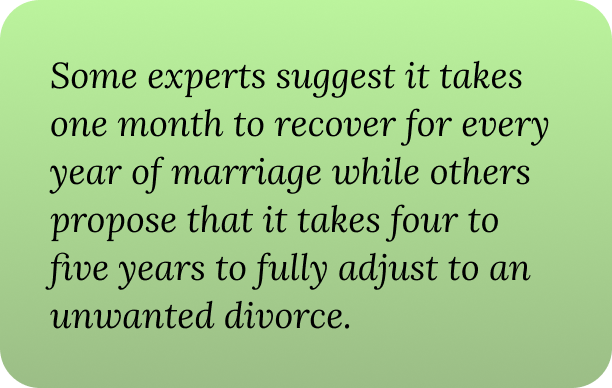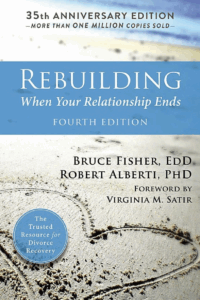Is there a timeline for divorce recovery?
Writer Stephanie Vuckovic discovers we each have our own path to healing.
Divorce Recovery
A colleague asked recently if I had recovered from my divorce, which happened almost three years ago. I didn’t know what to tell her.
How do you define recovery? It’s not as if there’s a 12-step program you can join like AA. Most days, I feel fine albeit with a new sense of “normal.” But sometimes memories of my married life flood back, showering me with sadness.
So I turned to Google to help me answer her question.
Recovery, according to the AI generator, involves “acknowledging and processing emotions, seeking support and focusing on self-care and personal growth.” I had done a good amount of that.
But was that enough to fully heal from divorce, which is defined as one of the most traumatic life events, on the list right behind the death of a spouse and just ahead of incarceration, personal injury/illness and job loss?
 My search revealed that “on average,” it takes one to two years to “recover from a divorce,” with recovery defined as healing and “moving on.” Times “vary greatly” depending on individual circumstances. Some experts suggest it takes one month to recover for every year of marriage while others propose that it takes four to five years to fully adjust to an unwanted divorce.
My search revealed that “on average,” it takes one to two years to “recover from a divorce,” with recovery defined as healing and “moving on.” Times “vary greatly” depending on individual circumstances. Some experts suggest it takes one month to recover for every year of marriage while others propose that it takes four to five years to fully adjust to an unwanted divorce.
My divorce was not wanted, at least by me. Even though my marriage had issues, I would have never left of my own volition. My ex-husband and I had spent 28 years together creating a life and two wonderful sons. So when he announced he was leaving, saying that we were better off “as friends” and that he needed to “find” himself, my world crumbled.
But I had to keep it together, at least on the surface, since my older son was home from college. What did I do?
The first weekend after my then-husband left, I visited two friends who had been divorced for at least ten years. I listened to their stories. I told them mine. They were so kind. They advised me to go easy on myself, to remain as healthy as possible and to forgo any major decisions for a while.
I walked several miles every day after work. My ex-sister-in-law, a divorcée herself, advised me to wear myself out so I could sleep at night.
During those first six months, I managed to fall asleep, but my overactive brain would wake me to rehash everything that had possibly gone wrong. I didn’t force sleep. I would turn on the light and record my thoughts in a newly-purchased journal.
 I bought Rebuilding When Your Relationship Ends, a book that details 20 steps to divorce recovery. I pored through the guidance on fear, grief, self-worth and letting go.
I bought Rebuilding When Your Relationship Ends, a book that details 20 steps to divorce recovery. I pored through the guidance on fear, grief, self-worth and letting go.
I allowed myself to cry, usually behind closed doors. But frequently, sadness would creep over me while folding the laundry in our living room. I felt horrible letting my son see my pain, but it just seeped out.
Meals became torturous, something I never experienced in my entire life of weight watching and crash dieting. I had to push myself to eat,
I kept working. The distraction of discrete, sometimes mundane tasks served as a balm for the painful emotions searing my brain.
A therapist encouraged me to set boundaries. I refused to see or communicate with my ex except via email. The sound of his voice and the immediacy of his non-responses to my texts made me relive his rejection all over again.
I travelled to see college friends who reminded me of a time when I existed before my life with my ex. Those friends, as well as new ones, were anchors to my healing.
Not much of this came naturally. But I kept doing these things over and over for about a year. Until my constant sadness turned into self-awareness. Until I began realizing that I had spent so many years trying to get my ex to notice me that I failed to see that he wasn’t fulfilling my needs. And that I had not been happy either.
Slowly, I began recognizing my old self, the one that wilted when he walked out. For my own sanity, I now forgave, but could not forget, the cowardly way he left me by quiet quitting our marriage and slinking away. I realized that he didn’t deserve me as a friend, let alone a life partner.
My ex had already moved in with another woman about a year after he left. Why shouldn’t I seek out a companion? I signed up for local Meetup and alumni events, even a few dating apps. As a GenX 50+ woman who thought apps were for “losers,” I knew I had to evolve to heal.
Now, three years on, I no longer cry when thinking about the past, when mail arrives in my ex’s name or when looking at old family photos. I don’t think about him on a daily basis. I still refuse to see him in person if I don’t have to, which feels odd considering we spent most of our adult lives together. Does all of this mean that I’m recovered? I don’t know.
What I do know is that recovery can happen. But it doesn’t occur on its own. You have to actively seek it. You must believe in yourself and that you deserve a future. You have to make it happen. No one else can. And never forget, you are more than your marriage.
